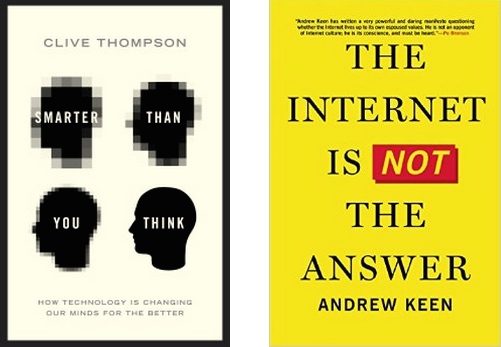Since its invention, the Internet has played a huge role in our daily lives. It has affected both our professional and personal lives, and many people cannot imagine a world without it. However, not everyone shares the same opinions about the digital revolution and its impact on society.

Clive Thompson is a journalist who writes about the affect of digital technology on everyday life. He is a contributing writer for The New York Times Magazine and columnist for Wired. Thompson is also the author of “Smarter Than You Think: How Technology is Changing Our Lives for the Better.”
Andrew Keen is one of the world’s leading authorities on the digital revolution, and often addresses its impact on business, education and society. He is the executive director of the innovation salon FutureCast and a columnist for CNN. He has written three books, including “The Internet is Not the Answer,” released in January.

Both will be at SXSW Interactive to engage in a conversation about the positive and negative impact of the digital revolution on society. The two will discuss technology’s impact on our intelligence and how the Internet influences our economic and social lives.
“We both enjoy each other’s perspective because we very strongly but respectfully disagree about the affect of technology on everybody’s life,” Thompson said. “It allows us to have a really productive conversation.”
After both recently wrote books that posed questions concerning what the Internet is good and bad for, Keen asked Thompson if he wanted to have a dynamic conversation and hash it out during SXSW Interactive. Thompson thought the opportunity sounded like a blast after speaking about his book at the 2014 event.
“I love the audience at SXSW; the people are pretty smart and really get into these debates,” Thompson said. “The quality of the conversation and the questions they ask are just fantastic.”
Thompson hopes the audience will walk away from the conversation with a new way of thinking, and a new way of appreciating the things they are already intellectually enjoying about the Internet.
“My goal is always to explain that there are three concepts that help you understand what it is you’re already getting out of the Internet,” Thompson said. “You can think about it in a smart, critical and self-aware way. The one thing I try to do is lead people with a way to talk about what they enjoy, as well as what they dislike.”
Read on for the rest of the interview with Clive Thompson about the three things he believes the digital revolution is good for.
You seem to be the half of this duo who believes the Internet is the answer. What are some of the reasons you feel technology is making our lives better?
Clive Thompson:
“When I say technology, I basically mean the communication tools of the last 10-15 years. So what have they done? They’ve done a few really simple things that have implications that are so big and weird, we routinely don’t even notice them although they are omnipresent in everyday life.
For one, they basically make it possible for people to think out loud in ways they couldn’t before. Every time we talk to someone else in text messages, every time we have a conversation about news, every time we send instant messages or post in a thread on Facebook, every time we post what we’re seeing in Instagram or Snapchat, every time we get in a Twitter conversation based on a URL or picture somebody posted – this is basically taking things worth thinking about and exposing them to the rest of the world. It is something that is hard to appreciate because it’s such a dramatic change from 10-15 years ago.
Before the Internet came along, the vast majority of people wrote papers in high school and college and then they graduated, and they never wrote anything down again for the rest of their lives. That was it for the setting down of their thoughts and certainly it for showing it to someone else. You have a sudden eruption of this conversational switch in society where we’re setting down and exposing our thoughts to other people, and I’m very interested in what that does to the quality of our everyday thought.
After talking to tons and tons of cognitive experts, like sociologists, anthropologists, and psychologists, I tried to put together some theories as to what it does to us. The shift from just thinking about something in your head to communicating it to someone else is massive. For years, study after study has shown that people often think more carefully about what they’re trying to say. They work harder communicating and it crystalizes more in their minds.
The second thing that is happening is that once people start exposing their thoughts, connections are made between people who did not know the other one previously existed. Everyone has some weird thing that they are obsessed with, and they have found their weird tribe online somewhere. These communities of interests that emerge are absolutely massive and extremely intellectually significant for people. This is where collaborative thinking really shines.
Another thing that’s happening is the fact that modern communication technology has not only changed who you can talk to, how you can talk, and how you can expose your ideas, but the way in which you do it. All these modes of conversation and rhetoric that used to be incredibly expensive and difficult to do – like video, pictures, graphics and manipulations of data – have become cheap. They have become something that the average person can do.
To me, the public nature of thought, the connected nature of thinking and talking, and the different modes that allow us to think and talk about different things is what the Internet is enormously good for. For traditional journalists and academics, there is nothing new about this experience for them. They’ve been communicating publicly for decades, so they don’t understand how transformative it is for the average person to suddenly be doing it.
The Internet is revolutionary in the amateur sphere. When there is no money at stake, and it’s just people talking to other people, learning things and exchanging ideas, some of the most amazing things happen intellectually in people’s lives, over and over again.”
Session Details
Sunday, March 15
12:30-1:30 p.m.
Hyatt Regency Austin
Texas Ballroom 4-7
208 Barton Springs Rd
For more information on this panel about the impact of the Internet, visit http://schedule.sxsw.com/2015/events/event_IAP39704.

